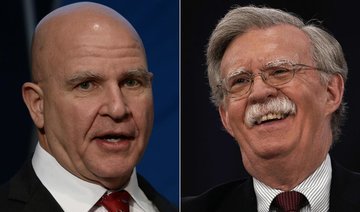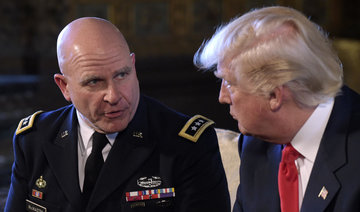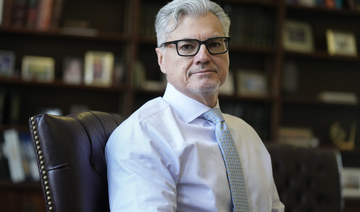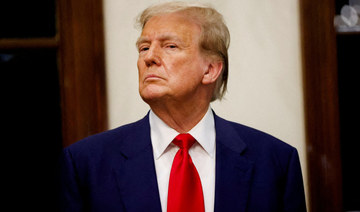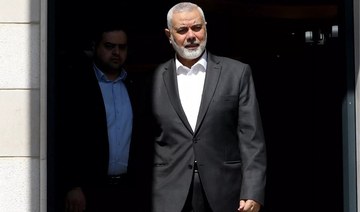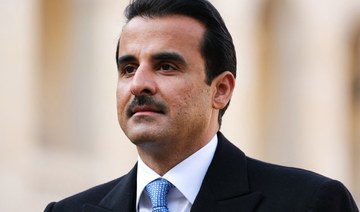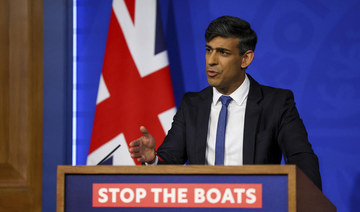NEW YORK: US President Donald Trump’s choice of John Bolton as his new national security adviser reflects a shift in his administration toward more hawkish stances on the nuclear programs of Iran and North Korea, analysts told Arab News on Friday.
Trump shook up his foreign policy team on Thursday for the second time this month by replacing H.R. McMaster with Bolton, a former UN ambassador who has advocated the use of military force against Pyongyang and Tehran.
Fahad Nazer, a fellow at the National Council on US-Arab Relations, a Washington-based cultural group, said the appointment will go down well in Saudi Arabia, the UAE and other members of the six-nation Gulf Cooperation Council (GCC).
“Ambassador Bolton is a well-known commodity who understands the sources of instability in the Middle East and who believes in clear and firm positions to counter-security threats. I think that countries in the GCC and beyond will appreciate his clear positions and resoluteness in the face of the myriad challenges the region faces,” Nazer told Arab News.
“Saudi-US relations are longstanding and have continued to strengthen, broaden and deepen over the past eight decades regardless of who is in the White House or the administration. Relations are built on shared interests and concerns, and are based on institutions.”
Bolton starts work next month and will advise Trump on everything from the fight against Daesh to China’s economic rise, Russia’s election-meddling and looming nuclear talks with North Korean leader Kim Jong-un.
The 69-year-old Bolton is a Fox News analyst who considered a run for the Republican presidential nomination against Trump and others in 2016. He is a colorful figure in Washington, with a pronounced moustache and trenchant views on global challenges.
Bolton famously kept a defused hand grenade on his desk at the State Department during former President George W. Bush’s administration. His 2007 memoir is titled “Surrender Is Not An Option,” and he often criticizes North Korea, the UN and European governments.
On Iran, Bolton has tweeted that the 2015 nuclear deal “needs to be abrogated.” The Joint Comprehensive Plan of Action (JCPOA), as it is formally known, traded sanctions relief for time-limited curbs on Tehran’s uranium enrichment and other work.
This chimes with Trump, who has slammed “the worst deal ever” and threatened to axe the agreement in May unless Europe tightens the screws on Tehran by removing the so-called sunset clauses by which the pact expires.
Sigurd Neubauer, a Washington-based Gulf analyst, said Bolton’s appointment is a “logical step toward implementing” anti-Iran policies and raising the pressure on Tehran over other issues, such as ballistic missile testing and arming proxies.
“It is well understood in Washington policy circles that Trump’s objective to create uncertainty over whether his administration will pull out of the JCPOA is meant to squeeze Tehran financially, which depends on sanctions relief to operate its government and prevent the economy from collapsing,” Neubauer told Arab news.
The White House personnel switch, announced in a tweet and a White House statement, came little more than a week after Trump fired Rex Tillerson as secretary of state and nominated a tough-talking loyalist, Central Intelligence Agency Director Mike Pompeo, to replace him.
Lindsey Ford, a former Pentagon official and political and security director at the Asia Society think tank, said the appointments of Bolton and Pompeo removed restraining influences in the president’s inner circle.
“The immediate consequences of these changes will be most visible in the administration’s approach toward North Korea,” Ford told Arab News.
“Bolton has openly argued for a preventive strike option against Pyongyang’s nuclear program, while making clear his disdain for diplomatic agreements such as the nuclear deal with Iran.”
Many analysts point with concern to Bolton’s track record in the Middle East. As the State Department’s top arms control official under Bush, he pushed hard for the 2003 invasion of Iraq — a move ultimately based on false intelligence about mass-casualty weapons in the country.
Jeremy Ben-Ami, president of the pro-Israel lobby group J Street, described Bolton as a “completely inappropriate choice” whose sabre-rattling on Iran could result in a repeat of the errors made in Iraq, which is still struggling to recover 15 years after the US-led invasion.
“Bolton was one of the earliest champions of regime change in Iraq. He helped promote false information that led to the disastrous US invasion, a decision he continues to defend to this day,” Ben-Ami said in a statement emailed to Arab News.
“He has applied the same attitude and approach to Iran, publicly advocating in 2015 to bomb Iran and insisting that diplomacy could never succeed in preventing Iran from obtaining a nuclear weapon, even as negotiations to defang Iran’s nuclear program without firing a shot were just weeks away from reaching fruition.”
Bolton has also advocated keeping the Guantanamo Bay prison in Cuba open, applauded Trump’s plan to move the US embassy in Israel to Jerusalem, and proposed pressuring China by boosting US support to Taiwan, which Beijing views as a renegade province.
McMaster, hired early in Trump’s presidency to replace scandal-plagued Michael Flynn as national security adviser, had widely been expected to leave.
Trump and McMaster frequently clashed and the president was looking for a replacement, advisers said.
The White House said Trump and McMaster had “mutually agreed” that he would leave.
“I am very thankful for the service of Gen. H.R. McMaster, who has done an outstanding job and will always remain my friend,” Trump’s tweet said.
Trump security pick reflects hard-line stance on Iran
Trump security pick reflects hard-line stance on Iran
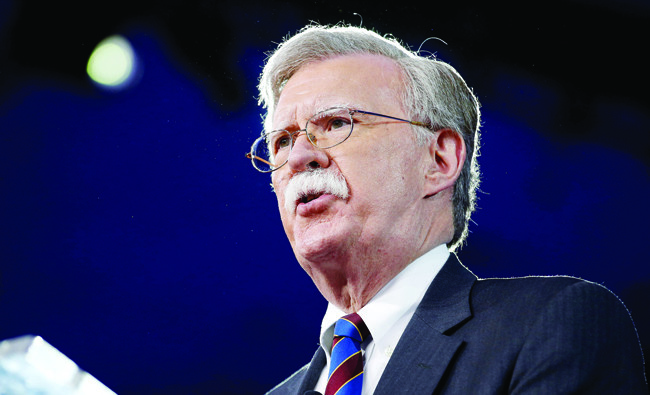
A Russian strike on Kharkiv’s TV tower is part of an intimidation campaign, Ukraine’s Zelensky says

“Four priorities are key: defense of the sky, modern artillery, long-range capacity, and to ensure that packages of American aid arrive as soon as possible,” Zelensky said
KYIV: Ukrainian President Volodymyr Zelensky said a Russian missile strike that smashed a prominent skyline television tower in Kharkiv was part of the Kremlin’s effort to intimidate Ukraine’s second-largest city, which in recent weeks has come under increasingly frequent attack.
The strike sought to “make the terror visible to the whole city and to try to limit Kharkiv’s connection and access to information,” Zelensky said in a Monday evening address.
The northeastern Kharkiv region straddles the approximately 1,000-kilometer (600-mile) front line where Ukrainian and Russian forces have been locked in battle for more than two years since Moscow’s full-scale invasion of Ukraine. The front line has changed little during a war of attrition, focused mostly on artillery, drones and trenches.
Since late March, Russia has stepped up the pressure on Kharkiv, apparently aiming to exploit Ukraine’s shortage of air defense systems. It has pounded the local power grid and hit apartment blocks.
On Monday, a Russian Kh-59 missile struck Kharkiv’s 250-meter (820-foot) -high TV tower, breaking it roughly in half and halting transmissions.
A Washington think tank said Russia may be eyeing a ground assault on Kharkiv.
“The Kremlin is conducting a concerted air and information operation to destroy Kharkiv City, convince Ukrainians to flee, and internally displace millions of Ukrainians ahead of a possible future Russian offensive operation against the city or elsewhere in Ukraine,” the Institute for the Study of War said in an assessment.
The expected arrival in Ukraine in coming weeks of new military aid from its Western partners possibly has prompted Russia to escalate its attacks before the help arrives, the ISW said, adding that trying to capture Kharkiv would be “a significant challenge” for the Kremlin’s forces.
Instead, the Russian military command “may attempt to destroy Kharkiv City with air, missile, and drone strikes and prompt a large-scale internal displacement of Ukrainian civilians,” it said.
The US Senate was returning to Washington on Tuesday to vote on $61 billion in war aid to Ukraine after months of delays. Zelensky said US President Joe Biden assured him the aid would include long-range and artillery capabilities.
“Four priorities are key: defense of the sky, modern artillery, long-range capacity, and to ensure that packages of American aid arrive as soon as possible,” Zelensky said.
Also Tuesday, Britain pledged 500 million pounds ($620 million, 580 million euros) in new military supplies for Ukraine, including 400 vehicles, 60 boats, 1,600 munitions and 4 million rounds of ammunition.
The shipment will also include British Storm Shadow long-range missiles, which have a range of about 150 miles (240 kilometers) and have proven effective at hitting Russian targets, the British government said.
British Prime Minister Rishi Sunak spoke with Zelensky on Tuesday morning to confirm the new assistance. He was due to announce the aid later Tuesday during a visit to Warsaw where he was meeting with Polish Prime Minister Donald Tusk and NATO Secretary General Jens Stoltenberg.
Less cheering news came from the European Union, however. EU countries that have Patriot air defense systems gave no clear sign Monday that they might be willing to send them to Ukraine, which is desperately seeking at least seven of the missile batteries.
Ukraine’s army is also heavily outnumbered in the fight, and expanding the country’s mobilization has been a delicate issue.
Ukrainian Foreign Minister Dmytro Kuleba on Tuesday signaled that authorities plan to clamp down on young men of conscription age who have moved abroad, with details of the specific measures to be made public soon.
“Staying abroad does not relieve a citizen of his or her duties to the homeland,” Kuleba said on the social media platform X.
Meanwhile, Russia launched 16 Shahed drones and two Iskander-M ballistic missiles over Ukraine’s southern and central regions, the Ukrainian air force said Tuesday morning. It said all but one of the drones were intercepted.
In Odesa, an overnight attack injured nine people, regional Gov. Oleh Kiper said. Among those injured were two infants and two children aged nine and 12, Kiper said. City mayor Hennadii Trukhanov said 58 apartments in 22 buildings were damaged.
In other developments:
A Russian missile strike near Dnipro, Ukraine’s fourth-largest city, injured four people who were admitted to hospital, regional Gov. Serhii Lysak said.
Russian forces dropped a guided aerial bomb in Kostiantynivka, a city in the eastern Donetsk region, injuring five people who were riding in a car, police said. Two of them were in critical conditions.
Trump to meet with senior Japanese official after court session Tuesday in hush money trial
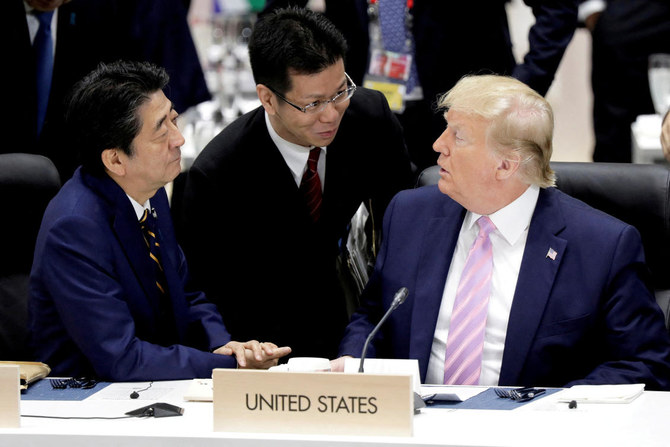
- “Leaders from around the world know that with President Trump we had a safer, more peaceful world,” said Trump spokesperson Brian Hughes
- Trump met last week with Polish President Andrzej Duda at Trump Tower and also met recently with British Foreign Secretary David Cameron and Hungarian Prime Minister Viktor Orbán
WASHINGTON: Former President Donald Trump is meeting with another foreign leader while he’s in New York for his criminal hush money trial.
The presumptive GOP nominee will host former Japanese Prime Minister Taro Aso at Trump Tower Tuesday, according to two people familiar with the plans who spoke on condition of anonymity because they had not been formally announced.
Aso is just the latest foreign leader to spend time with Trump in recent weeks as US allies prepare for the possibility that he could win back the White House this November.
“Leaders from around the world know that with President Trump we had a safer, more peaceful world,” said Trump spokesperson Brian Hughes in a statement. “Meetings and calls from world leaders reflect the recognition of what we already know here at home. Joe Biden is weak, and when President Trump is sworn in as the 47th President of the United States, the world will be more secure and America will be more prosperous.”
Trump met last week with Polish President Andrzej Duda at Trump Tower and also met recently with British Foreign Secretary David Cameron and Hungarian Prime Minister Viktor Orbán.
Trump was close with Shinzo Abe, the former Japanese prime minister who was assassinated in 2022. Aso is vice president of the Japanese Liberal Democratic Party and also served as deputy prime minister and finance minister under Abe.
Trump has threatened to impose broad new tariffs if he wins a second term.
Early Tuesday morning, he complained about the US dollar reaching a new high against the Japanese yen, calling it “a total disaster for the United States.”
“When I was President, I spent a good deal of time telling Japan and China, in particular, you can’t do that,” he wrote on his Truth Social platform. “It sounds good to stupid people, but it is a disaster for our manufacturers and others.”
The US dollar is trading at above 150 yen recently, up from 130-yen mark a year ago, which has made it more costly for Japan to import goods but has boosted exports.
President Joe Biden hosted current Japanese Prime Minister Fumio Kishida at the White House for talks and a state dinner earlier this month. During the visit, the leaders announced plans to upgrade US-Japan military relations, with both sides looking to tighten cooperation amid concerns about North Korea’s nuclear program and China’s increasing military assertiveness in the Pacific.
Bangladesh, Qatar sign 10 cooperation deals during emir’s first Dhaka trip
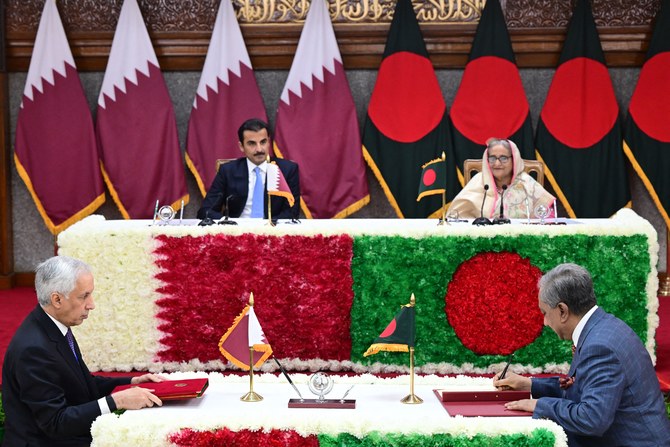
- Agreements cover investment, maritime transport and establishment of joint business council
- Bangladeshi president invited Qatar’s emir to invest in the country’s special economic zones
DHAKA: Bangladesh and Qatar signed 10 cooperation agreements on Tuesday as the Gulf state’s Emir Sheikh Tamim bin Hamad Al-Thani made his first official visit to Dhaka.
Prime Minister Sheikh Hasina and Sheikh Tamim witnessed the signing ceremony, which covered deals on investment, maritime transport, taxation, legal affairs and the establishment of a Bangladesh-Qatar joint business council.
The two countries also signed several memoranda of understanding, including on diplomatic training, education, labor, youth and sports, as well as port management cooperation.
Sheikh Tamim then held a meeting with President Mohammed Shahabuddin as part of his visit to Bangladesh, which is the second stop in the emir’s Asia tour that began in the Philippines on Sunday.
During their talks, Shahabuddin invited Qatar to invest in Bangladesh’s special economic zones.
“Bangladesh will welcome investments in various sectors including in state-led food supply chains from production to consumption such as agro-production and processing, food packaging, smart agriculture and fertilizer production,” Shahabuddin’s press secretary Joynal Abedin told reporters after the meeting.
“Qatar investors can get massive incentives and support in sectors like petrochemicals, energy, machineries, information technology, electronics, ceramics, agri-business, and food processing in Bangladesh.”
Shahabuddin also urged Sheikh Tamim to recruit more skilled workers from Bangladesh during their talks, Abedin said.
Qatar is currently the largest supplier of liquefied natural gas to Bangladesh. Earlier this year, the emirate signed a 15-year agreement with the US-based Excelerate Energy to supply 1 million metric tons per year of LNG to Bangladesh starting from January 2026.
The Gulf state is also home to about 400,000 Bangladeshis who live and work there, as it is one of the preferred destinations for migrant workers from the South Asian country.
India’s Modi calls rivals pro-Muslim as election campaign changes tack
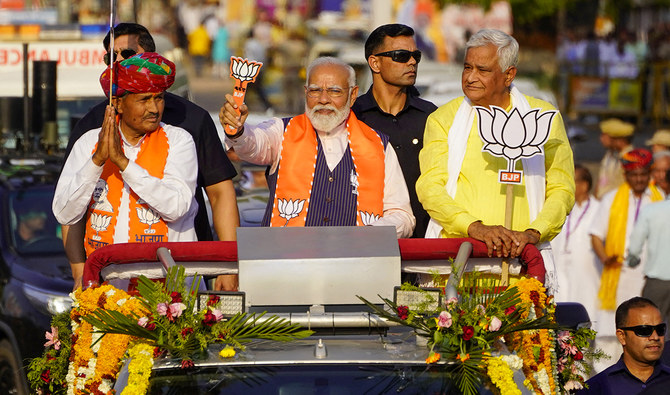
- Modi has accused Congress of having an election plan to redistribute wealth of Hindus among Muslims
- Modi’s government has repeatedly been accused of discrimination against India’s estimated 200 million Muslims
NEW DELHI: Indian Prime Minister Narendra Modi and his Hindu nationalist party have begun attacking opposition rivals, saying they favor minority Muslims, in what analysts see as a bid to invigorate their hard-line base after general elections began last week.
India began voting on Friday in a seven-phase election at which Modi seeks a rare third consecutive term, with campaigning that had so far largely focused on his record of growth and welfare as well as his personal popularity.
But in a speech on Sunday, Modi referred to Muslims as “infiltrators” who have “more children,” linking the comment to what he called an election plan of the main opposition Congress party to redistribute the wealth of Hindus among Muslims.
The Congress denied making any such promise and petitioned the Election Commission to act against Modi, who surveys suggest will win a comfortable majority, though analysts say his party wants to avert possible voter fatigue and overconfidence.
The controversial remarks were an unusual “deviation” from Modi’s usual practice as he rarely targets Muslims directly, said Hilal Ahmed, a political analyst at Delhi’s Center for the Study of Developing Societies.
They followed low voter turnout in areas where the BJP had done well in 2019, he added.
“The low turnout simply means that the committed BJP voter has not yet come out,” Ahmed said. “They obviously want the committed voter to come out. That is the reason for this deviation.”
The comment on redistribution of wealth to Muslims was supported and amplified on Monday by BJP members, including Modi’s powerful cabinet colleague, Home Minister Amit Shah, who mentioned it in a campaign speech.
Modi aired the claim again on Tuesday, a day after speaking about the gains Muslims have made during his 10-year rule.
In the southern state of Karnataka, half of which votes on Friday in the second phase of elections, BJP members have staged protests against last week’s murder of a Hindu woman by a Muslim man.
They say the incident is an instance of “love jihad,” a term Hindu groups use to accuse Muslim men of waging a campaign that lures Hindu women to convert to Islam with promises of marriage.
EXPOSING OPPOSITION, BJP SAYS
Modi’s government has repeatedly been accused of targeting and discrimination against India’s estimated 200 million Muslims, who form the world’s third-largest Muslim population.
The government has denied all accusations, and Modi has said he works for the betterment of all.
“Stating facts and exposing the flawed strategy of the opposition is our job,” BJP president J.P. Nadda told Reuters, when asked about Modi’s weekend comments.
But he said the BJP remained committed to its slogan of betterment, underlining reforms pushed by Modi’s government to help Muslim women and the poor among the community.
Another senior BJP leader and member of the party’s central election panel said Modi’s Sunday comments should not be seen as “polarizing,” as he had only reminded voters about the “Muslim-first strategy” of Congress and its allies.
He spoke on condition of anonymity as he was not authorized to speak to the media.
In January, Modi inaugurated a grand temple to the Hindu god-king Lord Ram on a once-disputed site believed to be his birthplace, fulfilling a longstanding promise projected by the BJP as a symbol of Hindu rejuvenation.
In campaign speeches Modi refers to the temple, but he has focused more on his development and welfare record and national pride to counter the opposition focus on joblessness, price rise and rural distress in the world’s fastest growing major economy.
“When the campaign started, the focus was entirely on development, welfare, reaching out to marginalized people and Hindutva came last,” said analyst Ahmed, referring to the Hindu nationalism espoused by the BJP.
“After the first phase, they realized they need to go back to their own voters ... back to the basics.”
16 dead, 28 missing in migrant boat capsize off Djibouti: UN
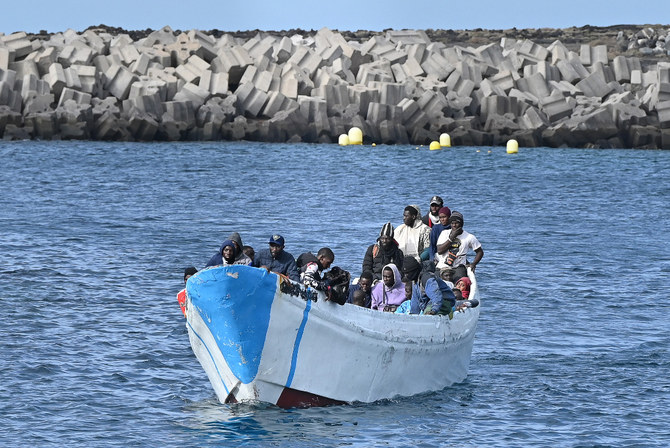
- The accident occurred about two weeks after another boat carrying mainly Ethiopian migrants sank off the Djibouti coas
NAIROBI: At least 16 people are dead and 28 missing in a new migrant boat disaster off the coast of the Horn of Africa nation of Djibouti, the UN’s International Organization for Migration said on Tuesday.
The accident occurred about two weeks after another boat carrying mainly Ethiopian migrants sank off the Djibouti coast, claiming several dozen lives.
“Tragedy as boat capsizes off Djibouti coast with 77 migrants on board including children,” the IOM said in a post on X, without specifying when the latest incident occurred.
“At least 28 missing. 16 dead,” it said, adding that the local IOM branch was “supporting local authorities with search and rescue effort.”
It was the latest deadly accident on the so-called Eastern Migration Route.
Another boat carrying more than 60 people sank off the coast of Godoria in the northeast of Djibouti on April 8, according to the IOM and the Ethiopian embassy in Djibouti.
The IOM said at the time the bodies of 38 migrants, including children, were recovered, while another six people were missing.
The embassy in Djibouti said the boat was carrying Ethiopian migrants from Djibouti to war-torn Yemen.
Each year, many tens of thousands of African migrants brave the perilous “Eastern Route” across the Red Sea and through war-scarred Yemen, escaping conflict or natural disaster, or seeking better economic opportunities.



